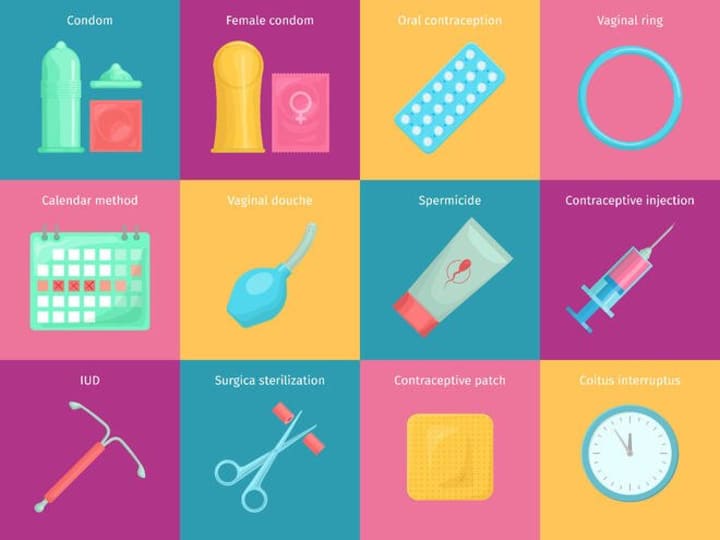Birth Control, Is It Right For You?
From A Fellow Woman Who's Been Around the Block

Birth control. It's not really talked about. We aren't fully informed. And honestly, it's a little scary to know which is right for you. As a young woman who isn't quite ready to have a baby (whereas my partner very much so is), I've been left to be in charge of making sure that my eggo does not get preggo.
Over the years we have tried several different methods and I'm here to help you figure out which method(s) might be best for you.
For starters, it depends on what you are looking for exactly from your birth control. Are you using it to help with PMS symptoms? Do you want to skip your period? Are you trying to protect yourself against STDs? Are you not ready to have a baby? How long do you want to wait? Is it more than one of these? All of the above? Ultimately, this decision is up to you. If you're unsure, you might want to start with a more temporary option or something that you need to use every time you have sex rather than something that has a bit of longevity to it.
Also, something important to ask yourself is if you want to take medication and introduce these chemicals to your body. Side effects are possible, as is with any medication. Things you may experience include but are not limited to: headaches, mood swings, nausea, weight gain, ache, breast swelling or pain, spotting or bleeding. The more severe symptoms include but are not limited to: leg pain that doesn't go away, shortness of breath, chest pain, liver problems, high blood pressure. If you struggle with a mental disorder (i.e. depression, anxiety, bipolar, etc) the possible mood swings you can experience may make your symptoms worse. If you experience any drastic mood swings while on birth control make sure you contact your doctor immediately so you can switch your dosage.
I know hearing these symptoms can be intimidating, but don't let it deter you. Everyone's body is going to react differently to birth control and you won't know how yours will react until you give it a try. Not everyone experiences side effects or are very mild. Personally, being on birth control (the pill and now the patch) I have experienced breast tenderness (but this is something I had experienced pre-birth control so it's possible this isn't caused from the birth control itself) and a bit of weigh gain when on the pill. I also have depression and anxiety, but have found that the occasionally mood swings haven't worsened my symptoms.
Having said this, overall I believe the benefits of birth control have outweighed the side effects for me. My PMS symptoms way better. I used to have debilitating cramps to the point where I had to call off of work because I couldn't get out of bed and now it's more of a manageable twinge. I also used to have a really heavy flow, to the point where I couldn't where a tampon longer than an 1.5-2 hours without leaking. My flow is much lighter and my sister who has also been on the pill has had months where her period consists of spotting or is barely even there.

Overwhelming, right?
If you haven't tried birth control before other than condoms or the pull-out method, I would recommend starting with the pill or the patch. Make sure you bring your concerns to your doctor and they can help recommend which method may be best for you as well as the correct dosage, but stick to your guns. If you know which method you would like, fight for what you want. Don't let a partner or even your doctor intimidate you out of the choice you have made. It is your body and you know it better than anyone else.
Here's a breakdown of contraceptive methods based off of their longevity:
Every time you have sex:
- Condom. Goes on the penis, prevents pregnancy and transmitting STDs. There are latex free options if you are allergic. Condoms are easy to apply and come in variety of textures for his and her pleasure and extra stimulation.
- Female Condom. Goes inside of the vagina, prevents pregnancy and transmitting STDs. There are latex free options if you are allergic.
- Pull-out method is when the male partner "pulls out" before ejaculation.
- Spermicide is a gel put inside the vagina that kills sperm. As always when putting anything in or near your genitals you want to test a small area to make sure your body won't have an allergic reaction. Some spermicides can get really warm and even cause a burning sensation.
- Vaginal Contraception Film is a thin film that is inserted into the vagina. It dissolved and acts as a spermicide by creating a thick mucus-like membrane that is too thick for sperm to penetrate.
- Diaphragm is a small cup that is inserted into the vagina that creates a barrier to stop sperm.
- Contraception Sponge is a sponge that is inserted into the vagina that creates a barrier to stop sperm and also contains spermicide.
- Cervical Cap is inserted into the vagina and creates a cap over the cervix. It is recommended to use spermicide with this.
Daily-Weekly Methods:
- Fertility Awareness. By tracking your cycle and fertility partners, you can figure out your most fertile days (days to possibly skip having intercourse) and the days that your fertility is low. I recommend downloading an app that will help you track this information. I personally use an app called My Calendar. On this app, it allows me to put in the type of birth control that I am on, input different symptoms I may be having, tracks my fertility as well as when my next period will be. Even though I'm fairly regular, I find it helpful to see.
- Oral contraception (aka "the pill"). The pill is an oral medication that you take daily. It's important to take it during the same time with no more than an hour leeway. You have three weeks of an active pill and than one week off. This will be your period week.
- Contraceptive Patch. It's a small sticker-like patch that you adhere to your skin that increases cervical mucus, making it difficult/near impossible for sperm to get through. The patch gets replaced once a week on the same day. You can either continually wear a patch and skip your period or you can wear the patch for three weeks then one week off (this will be your period week). When using the patch you will want to make sure that you place it on an area of skin that doesn't crease too much and won't be rubbed by your bra strap or waist bands of underwear or pants. I found the best place to wear it is my butt cheek.
Monthly Methods:
- Vaginal Ring is inserted in the vagina and the hormones are absorbed through the vaginal lining. It prevents ovulation (so no egg is released) and increases cervical mucus. This needs to be replaced every month.
- Birth Control Shot is a shot you receive quarterly (every 3 months). It prevents ovulation and increases cervical mucus. I had a roommate who used this method and she absolutely loved it. She didn't have a period and had no side effects from the shot. The only problem she had with the shot was making sure she could make the doctor's appointment when she needed to.
Annual/Long Term Options:
- Birth Control Implant is a thin rod (about the size of a matchstick) that gets put under the skin in your upper arm. It increases cervical mucus and stops ovulation. This is good for 1-5 years. You can have it removed at anytime.
- IUD is a t-shaped implant that goes into your uterus. There are two types copper (sperm doesn't like copper) and hormonal which increases cervical mucus and prevents ovulation. This is good for 1-12 years dependent on that brand that you go with. A friend of mine has an IUD and she would highly recommend it. She enjoys not having to worry about making sure she has taken her birth control. She experienced some pain when it was initially inserted and some discomfort during her first month or two until her body was able to acclimate to the device and fully heal. It has also helped make her periods regular and super light.
For more information on these types of contraception, click here.
There are a lot of options out there and it's really important to take your time researching the best option for you as well as knowing your comfort level. Remember to consult your doctor about your options. It may be a good idea to also discuss your options with your partner and/or other women in your life if you're unsure or debating between different options. At the end of the day, the most important thing is to make a decision you're comfortable with and loving your body.
About the Creator
L. M. Williams
I'm a self-published author that enjoys writing fantasy/supernatural/romance novels and occasionally dabble in poetry and realistic fiction. If not writing, I'm a freelance artist and a full time mom.






Comments
There are no comments for this story
Be the first to respond and start the conversation.